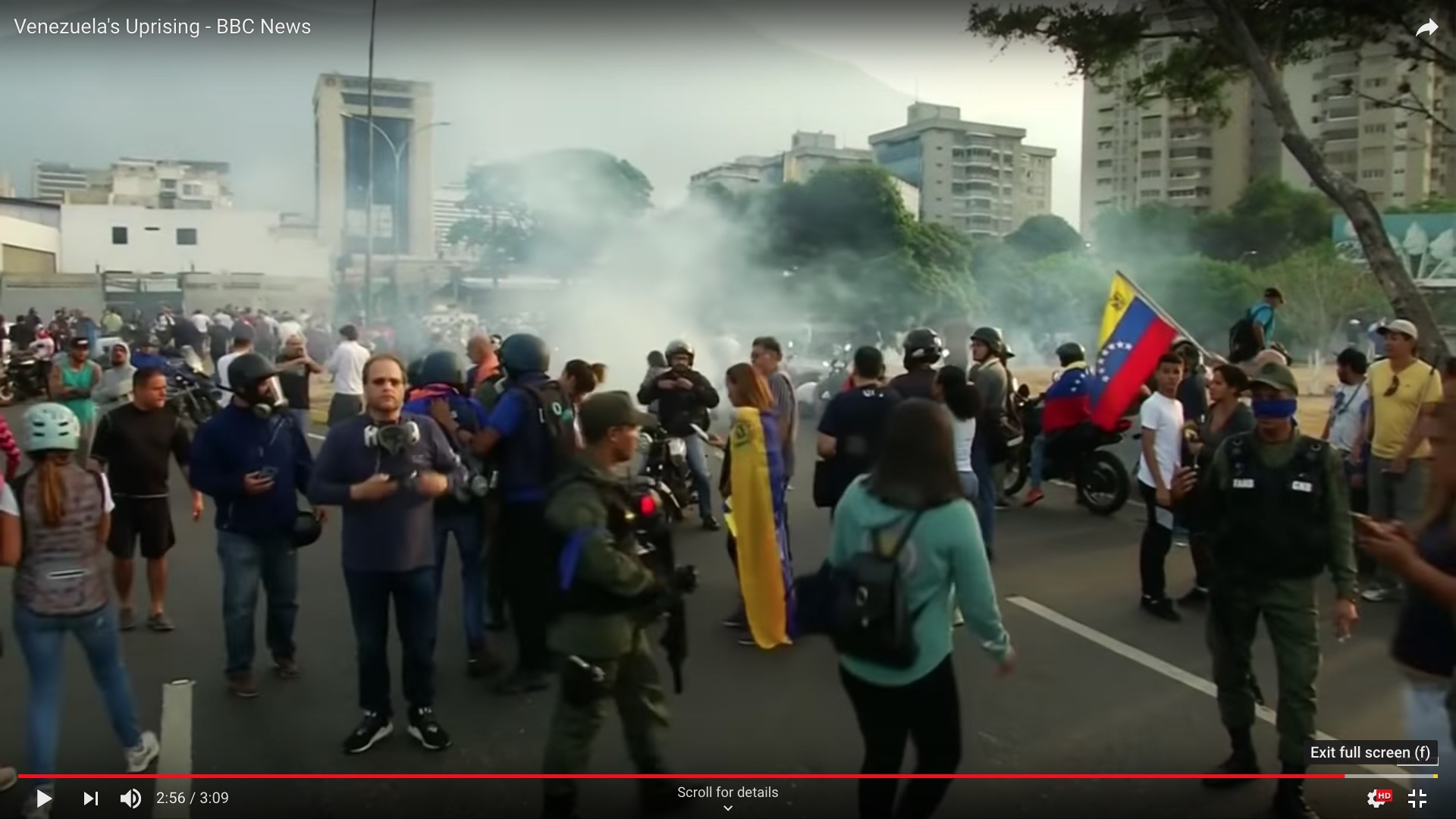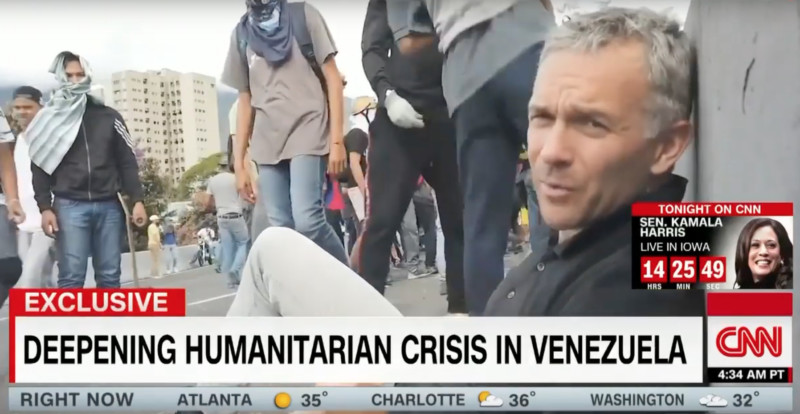Sign up for the daily CJR newsletter.
Last Tuesday, in the Venezuelan capital of Caracas, Juan Guaidó, the opposition leader in the country, called for a military uprising against the government of President Nicolás Maduro. It was a bold step in the country’s political crisis, which began in January when Guaidó swore himself in as interim president in the wake of a contested election. Soon, forces loyal to both sides fired tear gas at one another in the streets, while protestors lobbed rocks and Molotov cocktails.
As the clashes escalated, Guillermo Olmo, an international correspondent for the BBC, found himself and his crew caught in the turmoil. Olmo attempted standups, donning a black helmet and dark blue flak jacket, but the situation quickly deteriorated. His fixer moved Olmo and his crew—a producer, a cameraman, and a driver—to the roof of a nearby parking building, where they were able to continue their work in relative safety. “At this point, uncertainty is the only thing that can be taken for granted in Venezuela,” Olmo said in his broadcast.
Since Olmo first arrived in Venezuela, last July, conditions have fallen apart. Ill-defined and often unannounced “security zones” dot the capital, in which journalists are often stopped and sometimes have their equipment confiscated. And across the country, security officials at all levels seem entitled to harass journalists; that’s not to mention the pro-government paramilitary gangs, known as colectivos, which rove with impunity. Olmo avoids traveling at night, he says, and tries to keep a low profile.
As in many of the world’s danger zones, Venezuela’s political crisis has become an information war, Olmo says. “The country is so polarized that people on both sides think the media is just another part of the fight,” he says. “Information is seen as a weapon, something to be thrown into your adversary.” The local press has been ravaged by years of government attacks. And, it’s increasingly difficult for reporters to turn to local experts who aren’t already entrenched on one side or the other of the conflict, Olmo says.
Related: Venezuela’s war on the press
Following Tuesday’s violence, the opposition claimed that more than a dozen people had been killed by pro-government forces. The number was difficult to verify; there are no reliable official figures, and many civilians are reluctant to talk to journalists for fear of reprisal by the government. Nick Paton Walsh, a correspondent for CNN, visited the hospital in Caracas where the injured were taken. “We found exactly what we hoped we might not necessarily find,” Paton Walsh said, speaking to CJR from outside the hospital, as an ambulance—which he believes carried the body of a 14-year-old protester—wailed away from the building, trailed by police cars. Paton Walsh, who has reported frequently from Venezuela in recent months, says the only way to cover the country is to see it for yourself. “Both sides have repeatedly claimed that the other is on the edge of collapse,” Paton Walsh says. “And both sides continue to disappoint in terms of that standing up to reality.”
In Paton Walsh’s view, Guaidó has leveraged the international press, as well as social media, to show change as both imminent and inevitable in the country—even if that message is not always backed up by facts on the ground. “His team [has] been quite skillful showmen in that way,” Paton Walsh says. The press has been less kind to Maduro, whose government is by all rights responsible for the country’s years of economic and humanitarian decline. “No objective reporter can exonerate them, and that limits who they have been able to spread their message through,” Paton Walsh says.
On more than one occasion, Maduro’s response to unfriendly reporters has been to target and censor the press. On the day of the protests, feeds to CNN and the BBC were blocked on Venezuela’s cable television carriers, after they aired footage of military vehicles driving over opposition protesters.
According to Natalie Southwick, the Central and South America program coordinator at the Committee to Protect Journalists, threats, detention, and sometimes deportation are common tactics used by Maduro to limit negative coverage. In one week in January, security forces arrested ten journalists. Some were released. Others were deported. In February, Jorge Ramos, Univision’s best-known journalist, was detained in Venezuela’s Miraflores presidential palace, following a contentious interview with Maduro in which Ramos brought out pictures of Venezuelans trawling trash bins for food, contradicting Maduro’s storyline of a healthy economy. Ramos and his crew were swiftly deported to Miami, after security officials seized their video equipment, memory cards, and cell phones.
Often, when journalist’s equipment is confiscated, officials scan their devices in an effort to oust their sources and fixers. Reporters also face a digital threat, Southwick says, with the government able to tap into an army of online trolls. And lately, Southwick says, journalists wanting to get into the country have faced problems obtaining visas, especially those coming from countries whose relations with Venezuela are contentious. Many outlets have opted for workarounds, including reporting from Colombia.
Cody Weddle, an American freelancer currently in Bogotá, lived and worked in Venezuela for four years, contributing primarily to an ABC affiliate in Miami. Early one morning in March, his apartment in Caracas was unexpectedly raided by counterintelligence officials, and Weddle was deported to the US. The residency visa in his passport remains intact, however. “I expected them to mark it out with a Sharpie at least,” Weddle tells CJR. He has considered returning to Caracas but fears what might happen when he reaches immigration. From Bogotá, he gathers video and information from longtime sources and fixers in Venezuela, but he expresses frustration that he can’t get a feel for the mood on the streets himself. “I wish I was there,” Weddle says.
Fow now, according to Olmo, Caracas is quiet. “But, of course, it could change at any time,” he says. The BBC’s television feed in the country remains down, which Olmo regrets; he views a significant part of his job as serving the Venezuelan people, many of whom, he says, are tired of a polarized information environment and glad when they can get a clear-eyed take of the situation in their country. CNN’s feed also remains down, according a spokesperson for the network.
Paton Walsh says Maduro has refrained, so far, from a wholesale clampdown on journalists. In Paton Walsh’s assessment, Maduro might judge that it serves his interests for foreign journalists to observe for themselves that Guaidó, for all the support he has garnered abroad, doesn’t actually have his hands on the levers of power in the country—and, moreover, that despite images of chaos on foreign newscasts, daily life in the country largely carries on as normal. “Even if that normal is shockingly, horrifyingly bad and sadly quite preventable,” Paton Walsh says.
In March, Paton Walsh and his crew stood on a bridge in Cucutá, Colombia, just across from the Venezuelan border. A week prior, the bridge had been the site of bloody clashes between Venezuelan security forces and opposition protestors who were advocating, in vain, for much-needed aid to be allowed into the country. But now the bridge was empty, with a grotty shipping container splayed across its width, blocking passage. The area still buzzed with people, though, many of whom appeared to be disappearing into distant foliage. “We wondered, Where on earth are they all going?” Paton Walsh says.
The crew followed the crowds to a rocky riverbed, where people carrying all manner of food and supplies helped each other along slippery stones into Venezuela. “There had been all this artifice about the police being in control and the border being closed,” he says. “and suddenly you see right in front of you that it’s all nonsense, that basic human needs have won out.”
ICYMI: Jorge Ramos’s expulsion, and the sorry state of Venezuelan media
Has America ever needed a media defender more than now? Help us by joining CJR today.








